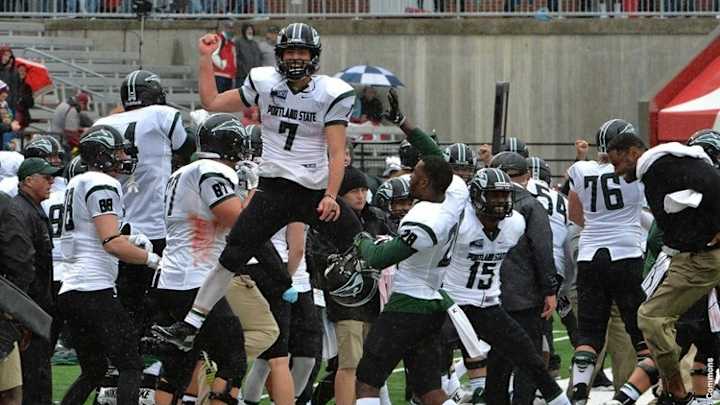FCS scholarship offers can beat the FBS

(STATS) - A record five straight national championships would seem to make North Dakota State the place to be come national letter of intent day, but the lure of playing at the elite FCS level doesn't always win out against another difficult opponent:
An FBS program that also is offering a scholarship to a high school recruit.
Last week, North Dakota State, fresh off yet another FCS title, had a third prospect who had previously given a verbal commitment to this year's recruiting class switch his allegiance to an FBS school. Like other high school seniors, he can make his decision official on Wednesday by signing on the dotted line.
Wins and losses are always occurring in recruiting circles. In the Bison's case, their unprecedented success probably puts them into the mix with an even higher level of recruit than before their championship run, and that increases the chance of losing some to FBS offers.
But FCS coaches are able to sway enough high school seniors who have FBS offers that they won't shy away from the recruiting battles. And they have game plans for it.
"We're not going to beat Michigan or Ohio State on a player," Sam Houston State coach K.C. Keeler said. "But there is no difference in the quality of football in the FCS and lower-tier FBS. And, at that lower-tier (school), it's brutal when you don't win.
"Sam Houston has won 56 games in the last five years. We're one of three programs that has gone to the playoffs five consecutive years and been in the semifinals four times. There's a formula here and support here.
"Bigger is not better. Better is better."
Clint Conque, who coaches Stephen F. Austin in the same Southland Conference as Sam Houston, echoed Keeler's sentiments. The Lumberjacks won't beat Texas on a recruit, but the UTEPs and Texas States, well, they'll have company from Nacogdoches.
"I think here in the south, you see us competing very well with the Sun Belt Conference schools, some of the American Conference schools, Conference USA schools," Conque said. "So we're able to land a couple of those prospects from time to time."
Scholarships are a numbers game. FBS programs often overextend their scholarship offers to players prior to their senior year, casting a wide net with the hope that their top targets will pick their schools. Some of those offers will go away as a program fills its recruiting class, especially at a particular position, and those players who are still deciding their future can be prime targets for FCS programs.
A winning tradition, like North Dakota State's, is a plus in recruiting against some FBS programs, because, as Bison coach Chris Klieman pointed out, recruits recognize "not only the success we've had, but the sustained success. We can use that over another program that may not have been as successful."
There are many other reasons for a high school senior to pick an FCS program and coaches work all angles, from campus life to proximity from a recruit's hometown to style of play to athletic facilities to, especially, an opportunity to play earlier on the FCS level.
"I think for us to win those battles, the depth chart plays a big role," Chattanooga coach Russ Huesman said. "Is there playing time, how many guys do we have at that position, and questions like that play a part in it. It helps if you have a spot open and they know they have a chance to play early.
"We also sell that fact that you can come here and compete for a national championship. We say that you are playing for a national championship (in the 24-team FCS playoffs) and not a lower-level bowl game.
"Geography can also be important for us because we are close to some excellent recruiting areas. If the FBS offer is from a school far away, we may have an advantage (when the player) wants to stay and play closer to home."
"We will try and sell location," said Charleston Southern coach Jamey Chadwell, "because most FBS schools we compete against in recruiting are in colder environments and farther away. We sell that and the closeness to their family so they can catch more of their games in person."
Relationships between coaches and prospects are important, especially in a two-year recruiting cycle. If an FCS program has recruited a player for a longer period than an FBS program that suddenly sees a rising prospect and jumps in late in the process, the bonds can be secure already.
Also, as FCS Coach of the Year Bruce Barnum of Portland State says, he's not just recruiting players for the next four or five years, he's selling them on the next 40 years of their lives.
Yes, education wins, too, against the FBS. "Parents like that one best," said Barnum, whose team beat two FBS opponents on the field last season.
